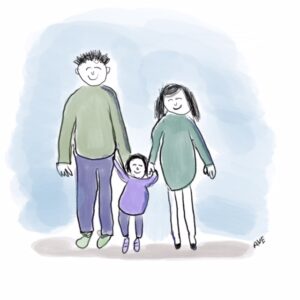
Recently, I have been deeply moved by the countless stories shared by coaching clients, colleagues, neighbors, and friends. The pain they feel due to political polarization is not a solitary experience but a global phenomenon. Families, once a source of support, now find themselves in a state of estrangement and anger. The question that echoes in many minds is: How can someone I care about perceive the world so differently? There are pressures to choose our “team”. This situation is profoundly painful and complex, often leading to a sense of disconnection from our loved ones as the only viable option.
Many are paying attention to social media and other forms of media that reinforce a specific view, making it hard to see other perspectives or to be open to learning. In fact, our own “team” could criticize or ostracize us if we entertain different views.
The Challenge of Polarization
We often view our own perspective as principled while seeing the other side as driven by narrow self-interest. The instinctive reaction is to argue, hoping to change the other person’s mind. However, this only escalates the argument and increases stress. When someone disagrees with us, we assume they are making us wrong, and we naturally become defensive. Some resort to sending articles or asking other family members to intervene, but this approach rarely works. Often, both sides interpret the same facts differently, leading to even more division.
A Personal Perspective
I have witnessed this kind of polarization both in the workplace and within families. Personally, I grew up with parents who saw the world through very different lenses. This lifelong experience has driven my quest to understand how we can foster open-mindedness. This question is at the core of my work and the OASIS Conversations process and the Open Stance postures model, which have been tested successfully worldwide over the past few decades. I have benefitted from listening and trying to understand how someone comes to their views and why they are important to them.
The Path to Openness
The journey towards resolving polarization begins with a profound self-awareness. It’s crucial to recognize that our backgrounds and experiences shape our perspectives. We need to become aware of our judgments and acknowledge when we are not open to listening and learning. By catching these reactions, we can shift our mindset to one of openness. From this state, we can genuinely listen with curiosity and compassion. When we are open and empathetic, we are more likely to find common ground and often co-create solutions. It is helpful to ask people to share their personal stories rather than debating abstract political views. We can focus on respecting others. This journey is not just about reconnecting with our loved ones, but also about personal growth and understanding. There is power in simply being open and listening. We may agree to politely agree to disagree and appreciate the other’s conviction. When people feel unheard or silenced or labelled, there is little hope of moving forward.
Practical Steps to Foster Connection
– Start with Self-Awareness: Notice your judgments and reactions. Recognize when you are not open to listening. Take a time-out, if needed. Remind yourself, “I don’t know what I don’t know” and there are multiple perspectives.
– Shift to Openness: Make a conscious effort to be open-minded. Approach conversations with curiosity, humility, and a willingness to understand.
– Listen with Empathy: Genuinely listen to the other person’s perspective. Show empathy and acknowledge their emotions.
– Seek Common Ground: Identify areas of agreement and shared values. Use these as a foundation to build understanding.
– Appreciate Differences: Recognize and appreciate the unique qualities of the other person. This doesn’t mean you have to agree, but it shows respect.
The Bigger Picture
Ultimately, we are all members of this nation and planet and benefit from creating environments where multiple perspectives are valued. By choosing to build relationships and engage in open-minded conversations, we contribute to a more connected and understanding world. Engaging in non-political activities with family members and colleagues, such as a meal or a community project, can help emphasize our common humanity.
Your Role and Invitation
I encourage you to embrace the challenge of engaging in open-minded and open-hearted conversations during these trying times. It is useful to brush up on your listening skills and recall your intention to be respectful. Take care of yourself too.
Organizations like Braver Angels and Living Room Conversations are providing options for civil discourse, where participants can understand other people’s perspectives. Such forums are ways to expand our perspective about other people’s views.
I know this is a challenging time for all of us. Be sure to get empathy from others.
Share what you are learning and the strategies that work for you. Together, we can navigate this polarization and find ways to reconnect with those we care about.
You are welcome to receive sample chapters of OASIS Conversations here: https://forms.aweber.com/form/59/1587493659.htm
